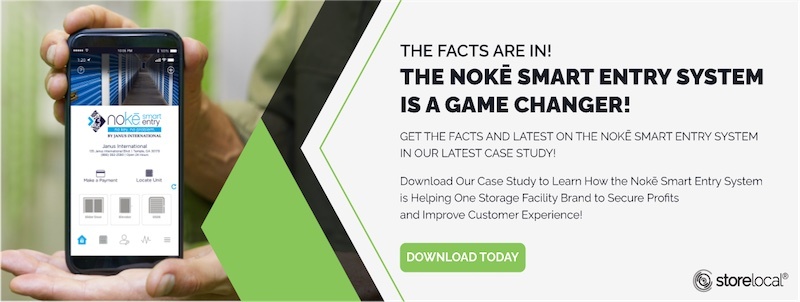As a storage facility owner, you’re likely always looking for ways to make more money. While renting storage units is your bread and butter, there are other ways to bring in additional profit (such as offering storage retail items which we covered previously) than what the storage units cost or offering niche storage options (like climate controlled storage or RV and boat storage).
Another way to bring in additional revenue is through storage unit fees. Now, things like late fees may seem insignificant, but storage fees can quickly add up for storage unit companies.
Charging Self Storage Fees (and Being Transparent About Them)
People have come to expect occasional fees for special services, late payments, and so on. While no one loves fees, if you’re honest and upfront about them, tenants will know what to expect when it comes to what your storage units cost.
It’s sneaky or unexpected hidden fees that can really get people riled up. So, as long as tenants know when they’ll be charged a fee and why, they’re less likely to become frustrated or unsatisfied.

Transparency is key when it comes to fees. Business.com writes, “Companies that embrace transparency as a core business value find that this practice leads to trust, which leads to customer loyalty, which leads to business success.”
The article further cites transparency studies that reveal that 94% of consumers would be loyal to a brand that offers complete transparency, and nearly three-quarters of respondents said they would be happy to pay more for a product that was completely transparent in all aspects. The study also found that nearly 40% of customers would switch from their preferred brand to another that offers more transparency toward consumers.
10 Types of Storage Fees
There are ten types of late fees that self storage facilities can consider, regardless of storage unit size. Just remember to always be transparent with fees on your storage units. Storage unit customers should be able to find details about them in their contract or on the company website.

1. Late Fee
Anyone who has a credit card is familiar with these. Late fees are common across all industries, although it’s important to read up on your individual late fee state laws, as there may be guidelines about how much you can charge in late fees.
Typically, late fees on self storage units are about 20% of the monthly rental rate, and “late” generally means 30 days or more.

Self storage unit late fees are typically 20% of the monthly rent, and “late” typically refers to a period of 30 days or more. But, not always.
Late Fee Example for Storage Unit Businesses
For example, in New Jersey, the late fee law states that storage operators may charge their tenants a late fee of $20.00 or 18% of the monthly rent of the storage unit, whichever is greater. So, be sure to do your homework.
2. Lien Fee
Lien fees are charged to tenants in possession of a storage unit that’s about to go to auction. These tenants have not paid up within the 30-day period (state laws may vary).
When it comes to storage units, these fees are intended to recoup the money storage operators must spend during the lien process (e.g., advertising the auction, hiring an auctioneer, and other administrative costs related to a self storage unit).

Although lien fees are not regulated by the states, it’s important to break down the expenses so that the delinquent tenant understands what they’re being charged for. Of course, if they’ve failed to pay for the storage unit cost in a timely manner, they’re liable to not pay the lien fee; these storage unit costs can then be recouped through the storage unit auction itself.
3. Non-Sufficient Funds Fee
You can charge a non-sufficient funds (NSF) fee if a tenant writes a check from a closed account or an account with insufficient funds to cover the payment of their storage space. NSF fees are regulated by state law, so be sure to research what you’re allowed to charge in your individual state for a storage unit rental.

Charging an NSF fee can also help self storage facilities recoup the money lost if they incurs a bank fee for having presented the bad check (sometimes called a “return deposit fee”).
4. Overlock Fee
If a tenant fails to pay for their storage space on time, in addition to a late fee you can place an ‘overlock’ on their storage unit and charge for this process.
An overlock for an automated facility simply involves disabling the lock on the storage unit, while an overlock for a manual facility involves placing a second lock over the existing lock to keep the delinquent tenant out.

Once they’ve paid what is owed, the overlock is removed from the storage units and a few can be charged for the manager’s inconvenience of putting on, and then taking off, the overlock.
5. Extended Access Fee
If you have a strong security system that uses automation technology at your storage unit facility, you may want to allow customers 24/7 access and can charge a small monthly fee for this.
Having anytime access to a storage unit can be especially useful for e-commerce companies that use your facility as a storage hub between production and shipping.

6. Emergency Fee
It’s uncommon, but if your facility doesn’t offer 24/7 access there may be times when a tenant needs to get into their storage unit after normal business hours.
If you have help available on-call to let someone into their storage unit, you can charge for this service as part of the storage unit costs due to the inconvenience placed upon management.
7. Administration Fee
Most storage unit companies charge a small storage administration fee when the lease is signed. If a tenant questions it, you can justify the fee by highlighting the paperwork that needs to be processed.

If you utilize a key fob system, you can also hand over their key to make them feel like they “got something in return.” You may consider waiving the fee if they agree to sign up for auto-pay, which helps guarantee that you receive payment for their storage unit each month.
8. Package Acceptance Fee
Some storage owners don’t want to take on liability for packages delivered to their tenants, however, if you have a quality tenant who always pays on time it might be a consideration.

Salespeople, for example, often use a storage unit to house materials while they are on the road. Their schedule, however, keeps them from receiving shipments at a reliable time.
As a service, you may offer to accept deliveries of packages for tenants on their behalf, keeping the goods in the main office until they can collect them. If that’s going to take up too much space, you can also gain the tenant’s permission for delivery drivers to put the items in their storage unit (either using an extra key or their access code).

Ask Yourself If The Liability Is Worth It
Of course, it’s important to understand that if you accept deliveries, you’re taking on additional liability. You have a duty to care for the tenant’s property while it’s in your possession.
If you charge a fee, your duty of care is ordinary; if you do not charge a fee, your liability is limited to gross negligence only. So, carefully consider whether or not the liability outweighs the income from the fee (and whether or not accepting shipments will cost you potentially good tenants).
9. Cleaning Fee
Some tenants can leave a mess in their storage unit when they move out, or large items that can be difficult to dispose of. So, be sure to include a storage cleaning fee statement in each contract.
Example of Statement
Something simple like, “Ruumi Self Storage charges a $200 cleaning fee if trash/items are left in your unit. Please make sure that your unit is clean and broom-swept upon your move out date to avoid this fee."
10. Lock-Cutting Fee
Storage tenants seem to have a knack for losing their key. Make sure that your contract specifies that they are not to attempt to cut the lock off on their own, as this could damage the door or hasp. You might also include a fee if they do try this on their own.

You can then charge a storage lock cut fee to offset the value of the lock and supply a new one. Of course, many storage facilities have moved to automated systems which simplifies this process (read more in this Nokē Smart Entry system case study).
Charging Self Storage Fees The Right Way
No one likes to pay self storage fees, but sometimes they're unavoidable. Otherwise, tenants can take advantage of your good nature.
Just always be transparent, and include all potential fees in any lease agreement (you might want to post a storage fee sign as well).

Not charging certain storage unit fees, or do you charge the lowest fees in town? You’ll want to mention that to your new tenants as well so they know what a good deal they’re getting and will continue to do business with you. And remember, you don’t have to charge a lot for storage fees to quickly add up and boost your bottom line!
